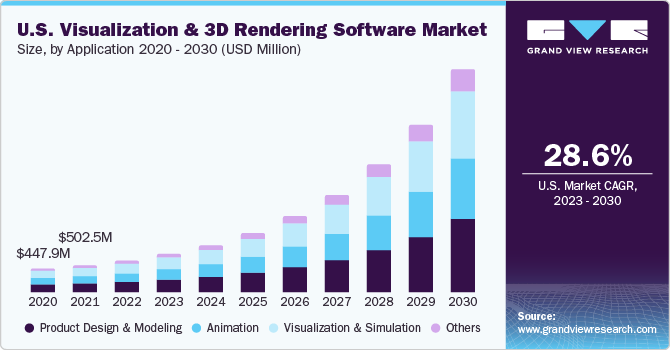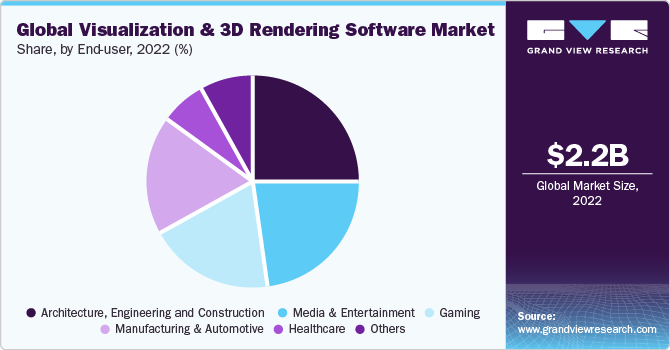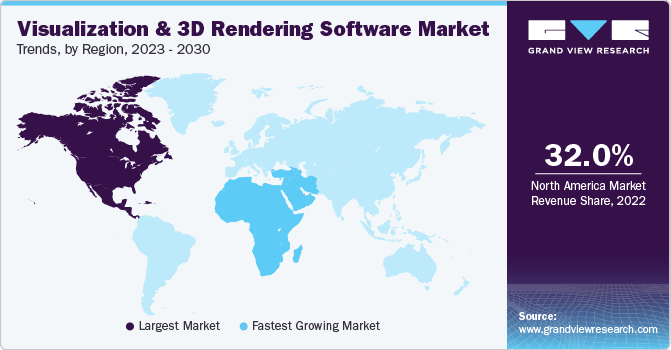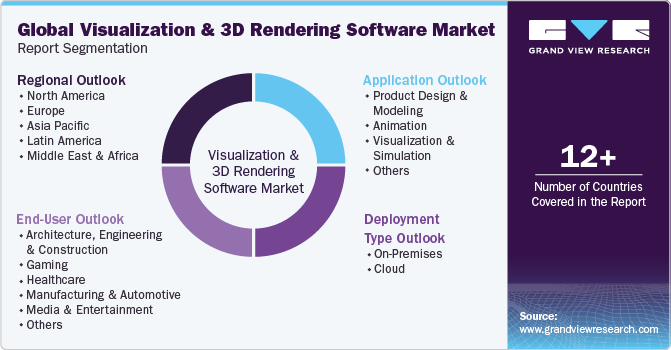- Home
- »
- Next Generation Technologies
- »
-
Visualization And 3D Rendering Software Market Report, 2030GVR Report cover
![Visualization And 3D Rendering Software Market Size, Share & Trends Report]()
Visualization And 3D Rendering Software Market (2023 - 2030) Size, Share & Trends Analysis Report By Deployment Type (On-Premises, Cloud), By Application, By End-User, By Region, And Segment Forecasts
- Report ID: GVR-2-68038-345-4
- Number of Report Pages: 101
- Format: PDF
- Historical Range: 2017 - 2021
- Forecast Period: 2023 - 2030
- Industry: Technology
- Report Summary
- Table of Contents
- Segmentation
- Methodology
- Download FREE Sample
-
Download Sample Report
Visualization & 3D Rendering Software Market Summary
The global visualization and 3D rendering software market size was valued at USD 2.20 billion in 2022 and is projected to reach USD 17.38 billion by 2030, growing at a CAGR of 30.6% from 2023 to 2030. Factors such as the increasing need for innovative technologies and just-in-time marketing are among the key market growth trends.
Key Market Trends & Insights
- North America dominated the market and accounted for the largest revenue share of 32.0% in 2022.
- The U.S. visualization and 3D rendering software market held a dominant position in North America in 2022.
- Based on deployment type, the cloud segment captured the largest share of over 77.7% in 2022.
- Based on application, the product design and modeling segment accounted for the largest share of 32.8% in 2022.
- Based on end use, the architecture, engineering and construction segment accounted for the largest share of 25.0% in 2022.
Market Size & Forecast
- 2022 Market Size: USD 2.20 Billion
- 2030 Projected Market Size: USD 17.38 Billion
- CAGR (2023-2030): 30.6%
- North America: Largest market in 2022
- Middle East & Africa: Fastest growing market
Additionally, the emergence of a user-friendly renderer interface and highly competitive rivalry play important roles in the development of the market. Increasing emphasis on cost and time management, growing focus on innovation, and soaring need for realistic media are the key factors that fuel the demand for visualization & 3D rendering software. The software enables enterprises to obtain real-time feedback and aids in decision-making for maximizing profit.
Visualization & 3D rendering software offers numerous benefits, such as improved processing, real-time insights, and a user-friendly renderer interface. Lack of proper infrastructure, especially in developing economies, is one of the biggest challenges for the market. Moreover, concerns about the design, development, and delivery of 3D content are anticipated to hamper the market's growth.
The software provides several solutions for product designing, modeling, animation, imaging, graphics, visual effects, and simulation. These solutions help in getting a clear insight into the product. The software also aids in reducing time and increasing the understanding of users for making better operational and marketing decisions.
Deployment Type Insights
Based on deployment type, the global visualization and 3D rendering software market is segmented into on-premises and cloud. The cloud segment captured the largest revenue share of over 77.7% in 2022 and is estimated to register the fastest CAGR of 31.7% over the forecast period. There has been a shift from on-premise to cloud deployment owing to technological advancements. Cloud-based solutions offer enterprises high scalability, increased mobility, and on-demand availability of resources. These factors enable cost and time optimization. Further, the availability of customized or tailored cloud solutions for enterprises is augmenting the preference for cloud deployment compared to on-premise deployment.
The on-premises segment is estimated to grow significantly over the forecast period. Data security concerns play a crucial role in the preference for on-premise solutions. Organizations, particularly those handling sensitive data or operating in highly regulated industries, often prioritize maintaining full control over their data by keeping it on-premise. It allows them to establish robust security measures and ensure compliance with data protection regulations.
Application Insights
Based on application, the market is segmented into product design and modeling, animation, visualization & simulation, and others. The product design and modeling segment accounted for the largest revenue share of 32.8% in 2022. The rise of virtual reality (VR) and augmented reality (AR) technologies has significantly impacted the demand for product design and modeling software. These technologies offer immersive and interactive experiences, allowing designers and customers to visualize and evaluate products in a realistic virtual environment. As a result, companies are leveraging VR and AR capabilities within product design and modeling software to enhance the design process, improve collaboration, and provide a better understanding of product aesthetics and functionality.
Visualization & simulation is a promising application segment estimated to attain a significant CAGR during the forecast period. Visualization & simulation allows enterprises to manage customer insights and provide customized services related to visual effects, animation, and graphics. Additionally, increasing competition encourages companies to adopt visualization & 3D rendering software to gain a competitive advantage over their contemporaries.
Animation provides a realistic customer experience and helps manage cost and time. Industries such as architecture, manufacturing, filmmaking, gaming, and others, use 3D animation to gain accurate design information.
The others segment is further sub-segmented into research, training, marketing, and advertisement. The others segment is estimated to register the fastest CAGR of 31.5% over the forecast period. The rise of digital marketing and the increasing importance of visual content in advertising campaigns have fueled the demand for visualization and 3D rendering software in the marketing and advertisement industry. Businesses are leveraging these software solutions to create stunning visuals and immersive experiences that capture the attention of their target audience.
End-User Insights
Based on end-user, the market is segmented into architecture, engineering and construction, gaming, healthcare, manufacturing and automotive, media & entertainment, and others. The architecture, engineering, and construction segment accounted for the largest revenue share of 25.0% in 2022. Architects and designers increasingly rely on 3D rendering software to communicate their design ideas effectively and provide clients with realistic virtual representations of their projects. These software solutions offer real-time rendering, virtual reality (VR) integration, and animation capabilities, enabling architects to present their designs more immersive and interactively.
The healthcare sector is poised to rise at a noteworthy CAGR over the forecast period. Visualization & 3D rendering software aids in training and educating personnel. The software helps view anatomical images, improving surgical planning, diagnoses, and outcomes. Additionally, it enables secure communication about a patient's condition with the patient's family.
Furthermore, the rising demand for sustainable and energy-efficient buildings is driving the adoption of visualization and 3D rendering software in the architecture segment. Architects are using these software solutions to simulate and analyze the environmental performance of their designs, including factors like energy consumption, daylighting, and thermal comfort. By incorporating sustainability considerations during the design phase, architects can optimize the building's energy efficiency and reduce its environmental footprint.

The others segment is further sub-segmented into energy & utilities and education. The others segment is estimated to register the fastest CAGR of 31.9% over the forecast period. The growing emphasis on sustainability and environmental concerns has prompted energy and utility companies to seek innovative solutions for efficient resource management and environmental impact assessment. Visualization and 3D rendering software play a crucial role in simulating and analyzing energy flows, optimizing energy consumption, and assessing the environmental impact of infrastructure projects. These tools enable decision-makers to visualize complex data and make informed choices to minimize ecological footprints.
Regional Insights
North America dominated the market and accounted for the largest revenue share of 32.0% in 2022, owing to the domicile of many prominent players such as Autodesk, Inc.; Adobe Systems Incorporated; and Dassault Systèmes. The region is anticipated to experience an upsurge in adopting visualization & 3D rendering software due to reliable wireless connectivity. Early adoption of the latest technologies in various sectors, such as architecture, engineering, construction, gaming, media & entertainment, and others, has positively influenced the regional market's growth.

MEA is expected to register the fastest CAGR of 35.3% over the forecast period. The construction and real estate sectors in the MEA region are experiencing significant growth. Visualization and 3D rendering software are crucial in architectural design, allowing architects and designers to create realistic virtual models of buildings and environments. It enables better visualization of projects, improved collaboration among stakeholders, and more efficient decision-making processes.
Key Companies & Market Share Insights
The industry players are undertaking strategies such as product launches, acquisitions, and collaborations to increase their global reach. For instance, in January 2022, Chaos and Enscape announced a merger that would result in a dominant force in the 3D visualization and design workflow application. This strategic alliance gained the backing of two private equity companies, American TA Associates and German LEA Partners, the latter of which is an existing investment in Enscape. With this financing, the newly formed firm is expected to continue to be known as Chaos, focusing on driving growth, promoting technological innovation, and strengthening its staff. The company primarily focuses on developing various visualization and computer graphics solutions for the architecture, engineering, construction, visual effects, and product design sectors.
Key Visualization And 3D Rendering Software Companies:
- Adobe
- Autodesk Inc.
- Chaos Software EOOD
- Corel Corporation
- Dassault Systèmes
- Luxion Inc.
- Next Limit
- Render Legion a.s.
- The Foundry Visionmongers LimitedTRIMBLE, INC.
Recent Developments
-
In June 2022, ALL3D announced its first-ever subscription service to interior designers, further democratizing 3D virtualization and rendering technologies in the home industry. This new cost-effective platform empowers designers to create and render client spaces in real-time, creating virtual products and designs. It grants them access to its expansive library of thousands of products and brand pages of sellable virtual products from ALL3D’s manufacturing and retailer consumers.
-
In June 2022, Adobe launched important updates to Adobe Substance 3D. Adobe Substance 3 is a comprehensive suite of tools and services facilitating 3D content creation throughout the project workflow. These updates aim to enhance the extensibility and performance of the tools. One notable addition is the introduction of a 3D Materials Software Development Kit (SDK) designed for developers, enabling them to create customized materials for their projects. Moreover, powerful new plugins have been introduced, and support for Apple M-series chips has been added to Painter, Designer, and Sampler, allowing for optimized performance on Apple devices.
-
In June 2022, 3D Cloud by Marxen partnered with Kingfisher plc to launch innovative 3D visualization, planning, and design technology to select markets. As part of this endeavor, a range of features will be offered, including a 3D kitchen and bathroom with virtual reality capabilities and mobile 3D product configurators. The newly developed 3D planning and design tool for kitchens and bathrooms provides an enhanced planning experience seamlessly integrating in-store colleague-led design systems with e-commerce.
-
In February 2022, Autodesk Inc. collaborated with ModuleWorks GmbH to enhance and expand its Fusion 360 software platform. This collaboration allows Autodesk to incorporate the powerful toolpath calculation technology developed by ModuleWorks into Fusion 360. Fusion 360 provides a unified workflow and a consistent user experience for product design and manufacturing processes. With this collaboration, Autodesk gains ongoing access to ModuleWorks' advanced toolpath calculation algorithms, which will further enhance the capabilities of Fusion 360 and provide users with even more powerful and efficient manufacturing solutions.
-
In April 2021, Luxion Inc., a global company specializing in 3D product design rendering software, partnered with GRO Capital to strengthen its position as a global leader in the industry and expedite its worldwide growth. Leveraging Luxion's impressive history of pioneering product innovation, GRO Capital will collaborate with Luxion to drive ongoing advancements, bolster sales and marketing initiatives, and expand the company's network of partners on a global scale, thereby accelerating its plans for international expansion.
Visualization And 3D Rendering Software Market Report Scope
Report Attribute
Details
Market size value in 2023
USD 2.69 billion
Revenue forecast in 2030
USD 17.38 billion
Growth Rate
CAGR of 30.6% from 2023 to 2030
Base year for estimation
2022
Historical data
2017 - 2021
Forecast period
2023 - 2030
Report updated
November 2023
Quantitative units
Revenue in USD million and CAGR from 2023 to 2030
Report coverage
Revenue forecast, company ranking, competitive landscape, growth factors, and trends
Segments covered
Deployment type, application, end-User, region
Regional scope
North America; Europe; Asia Pacific; Latin America; MEA
Country scope
U.S.; Canada; UK; Germany; France; China; India; Japan; South Korea; Australia; Brazil; Mexico; United Arab Emirates; Saudi Arabia; South Africa
Key companies profiled
Adobe; Autodesk Inc.; Chaos Software EOOD; Corel Corporation; Dassault Systèmes; Luxion Inc.; Next Limit; Render Legion a.s.; The Foundry Visionmongers Limited; TRIMBLE, INC.
Customization scope
Free report customization (equivalent up to 8 analyst’s working days) with purchase. Addition or alteration to country, regional & segment scope
Pricing and purchase options
Avail customized purchase options to meet your exact research needs. Explore purchase options
Global Visualization And 3D Rendering Software Market Report Segmentation
This report forecasts revenue growth at global, regional, and country levels and provides an analysis of the latest industry trends in each of the sub-segments from 2017 to 2030. For the purpose of this study, Grand View Research has segmented the global visualization and 3D rendering software market on the basis of deployment, application, end-user, and region:

-
Deployment Type Outlook (Revenue in USD Million, 2017 - 2030)
-
On-Premises
-
Cloud
-
-
Application Outlook (Revenue in USD Million, 2017 - 2030)
-
Product Design and Modeling
-
Animation
-
Visualization & Simulation
-
Others
-
-
End-User Outlook (Revenue in USD Million, 2017 - 2030)
-
Architecture, Engineering and Construction
-
Gaming
-
Healthcare
-
Manufacturing and Automotive
-
Media & Entertainment
-
Others
-
-
Regional Outlook (Revenue in USD Million, 2017 - 2030)
-
North America
-
U.S.
-
Canada
-
-
Europe
-
UK
-
Germany
-
France
-
-
Asia Pacific
-
China
-
Japan
-
India
-
Australia
-
South Korea
-
-
Latin America
-
Brazil
-
Mexico
-
-
Middle East and Africa
-
United Arab Emirates (UAE)
-
Saudi Arabia
-
South Africa
-
-
Frequently Asked Questions About This Report
b. The global visualization and 3D rendering software market size was estimated at USD 2.20 billion in 2022 and is forecasted to reach USD 2.69 billion in 2023.
b. The global visualization and 3D rendering software market is expected to grow at a compound annual growth rate of 30.6% from 2023 to 2030 to reach USD 17.38 billion by 2030.
b. North America held the largest revenue the market in 2022 and is expected to maintain its position over the forecast years. The high market share can be attributed to the domicile of a large number of prominent players such as Autodesk, Inc.; Adobe Systems Incorporated; and Dassault Systemes.
b. Some key players operating in the visualization and 3D rendering software market include Autodesk, Inc.; Dassault Systèmes; Trimble, Inc.; Corel Corporation; Adobe Systems Incorporated; The Foundry Visionmongers Ltd.; Chaos Software; and Luxion, Inc.
b. Key factors that are driving the market growth include increasing demand for virtual modelling and architectural building design, rise in urbanization trends and surge in smart city initiatives along with the need for innovative technologies and just-in-time marketing.
Share this report with your colleague or friend.
Need a Tailored Report?
Customize this report to your needs — add regions, segments, or data points, with 20% free customization.

ISO 9001:2015 & 27001:2022 Certified
We are GDPR and CCPA compliant! Your transaction & personal information is safe and secure. For more details, please read our privacy policy.
Trusted market insights - try a free sample
See how our reports are structured and why industry leaders rely on Grand View Research. Get a free sample or ask us to tailor this report to your needs.










